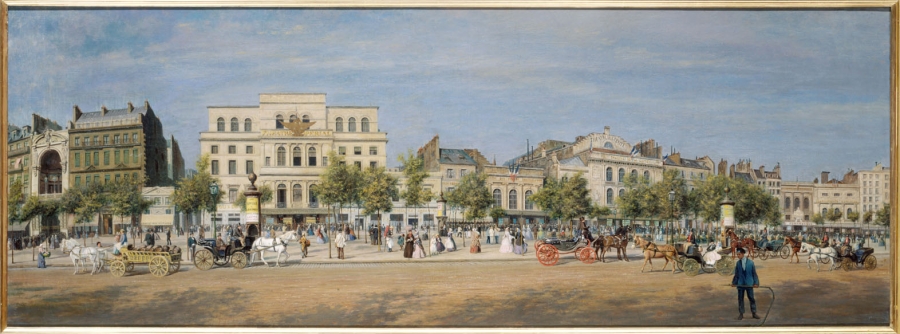
I had the opportunity to get to know this large and little-known canvas, “Vue générale des théâtres du boulevard du Temple, avant le percement du boulevard di Prince-Eugène, en 1862”, the day after a performance of mine at the Théâtre des Champs-Elysées in Paris, in 2012, thanks to the extraordinary French historian – and great Rossinian – Jean-Marie Bruson, at the time director of the Musée du Carnavalet (the museum of the history of Paris), which includes the painting in its collection.
The author, Martial Potémont (1828-1883), represents a place, today almost unrecognizable, famous for being the boulevard where several theatres stood, from the Théatre Historique founded by Alexandre Dumas to the Funambules, Délassements-comiques, Cirque Olympique…, one next to each other and protagonists of proposals of different types, from mélodrame to vaudeville, a magnet for a varied audience, to say the least, and attracted by Pierrot and Offenbach, by cafés or even simply by the danseuses and the guests of those stages all equipped with their own orchestra.
In 1862 Napoléon III announced a new urban plan that foresees a profound overhaul of the area with a new project, by the hand of the famous Haussmann: therefore déménager ou disparaître (to move or disappear), with the inevitable consequence of the demolition of those theatres.
With his painting the author conveys to us, and through the lens of his nostalgia, a historical document of unsuspected value.
Those theatres, so close together and active at the same time, inevitably generated gatherings, risky above all because they were difficult to control in the event of discussions or worse, unrests.
And it is on this boulevard that in 1835 the attack on King Louis Philippe who was passing by with his troops took place, an episode which, the last of a long series of scuffles and in conjunction with numerous crimes et meurtres sur scène, earned it the nickname of “Boulevard du Crime”, and which also marked the end of those theatres, apparently, in the name of a new city planning.
Almost as pointing out as a solution to control crowd – or crime – the demolition of those theatres.
Shivers, right?
Thinking back today, in the aftermath of a further unjustified fury against theatrical production – we are told due to a pandemic – leaves room for more than a bitter reflection.
Politics in Europe (including Great Britain) is following a frankly questionable trend, based on a primitive mentality, such as the one that transpires from the history of the painting, when the crowd has now been replaced by the overabundants of social media; … yet to pay the price again ‘the theatres’ and their protagonists.
The (finally) compact world of musical, theatrical, operatic, Terpsichorean and cinematographic production refuse it: it knows that it has done everything possible to protect the health of everyone, from professionals to the public and with valuable results, considering that the ‘curve’ did not certainly increase due to the above. The evidence called several times to a confrontation, as a result of the measures, remains not received (also the doubt of the effectiveness of the rules creeps up if their application has led to closure).
“The enemy is the virus”, says President Sergio Mattarella, echoed by other European leaders.
No.
Perhaps the first time in the spring, Mr President, not this in the autumn, that we feel strong as a punishment without having committed the crime.
We have been parked for most of the year preserving everyone’s health, starting with our loved ones we have chosen, many of us, not to go to visit to avoid further damage, and possibly having to choose to put our health in jeopardy to go to work, if a call had materialized, and for those few to whom this ‘luck’ has arrived, precisely because this sector of workers is not protected. Yes, this is the discussion: our category (which I would very much like not to be defined like that) is known not to be protected by particular instruments such as trade unions or associations in defence of copyright, still not focused enough, which is why we are more easily attacked.
Because, on the other hand, if the transport and health workers get nervous, buonanotte suonatori (precisely).
The summer months should have been used to increase, improve, update, rationalize health facilities, schools and transports with the same money that has been and is about to be spent again to keep people at home (resources that are not available anyway).
We have ‘just’ learned: lockdowns have shown to be useless as a means to an end. And now, with a domino effect, the various European governments support each other, shoulder to shoulder to keep standing, applying the same empty rules through decrees and de-cretini. Here, resignations are not to be hoped for (it would bring relief), on the contrary, full assumptions of all the side effects of crazy and senseless decisions. It is time for that much-rumored, but not applied, responsibility that must lead to the resolution of this disaster!
Europe should have meant, instead, getting around a table to draw up a unitary protocol of behaviour (making it observed, given that still today irresponsible people of various kinds continue to circulate still at large) analyzing the real cause of this increase in infections, instead of the dripping perpetrated daily as to blame us, but in truth to justify the current bankruptcy initiatives.
Instead, we need the money of freelancers – including artists – who, with the cash paid through taxes, have always covered a large part of those expenses.
Without evidence, we are stopped again, without help (yes, because if you surpass the threshold for the protection of a few thousand of any currency, you are outside the protections themselves, needless to say, that those who have earned more also bear many more expenses from the family to the professional chain of which it is an integral part).
And worse, with the mortification of the value of the person and of what she/he has invested to make this – preparing her/himself through rigorous discipline for decades – a reason for living.
The perception is that Culture is pointed out as unnecessary, to that fear of ideas, the same ones that have always made governments and dictatorships tremble, because we know, they can be subversive and… contagious.
© Anna Bonitatibus, 31.10.2020
